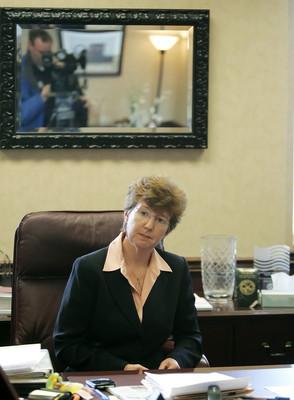Buckley: Stimulus bill will plug only part of budget hole
CARSON CITY -- Legislative fiscal analysts calculated that state government will net about $480 million in federal economic stimulus funds that can be used to plug part of a $1.8 billion hole in the governor's budget, Assembly Speaker Barbara Buckley said Monday.
She said legislators will need to come up with other ideas, including the elimination of some tax exemptions and abatements, to bring the general fund up to an adequate level.
"No matter what you assume, whether it's $2.4 billion or any other shortfall number, it appears the stimulus package will be valued at less than $500 million to assist us with our (general fund) shortfall," Buckley said at her weekly news conference.
"I don't mean to say that all the other money is not helpful," she added. "It's extraordinarily helpful."
In all, Nevada will receive nearly $1.5 billion in federal stimulus funds, but only about a third of it can be used to fill holes in the general fund, she said.
The $480 million represents the additional money for the general fund that the state will receive beyond what was expected when Gov. Jim Gibbons built his proposed $6.17 billion, two-year general fund budget and presented it to legislators last month.
State government also will get $210 million from the stimulus plan for transportation projects. That money is not part of the state's general fund, which includes revenue from sales, gaming and other taxes that go to support education and general government functions.
Other stimulus funds will go to the counties and for programs that don't come under the state's general fund, including Medicaid, renewable energy, special education, vocational rehabilitation, water quality and mass transit programs.
"These are rough numbers," said Buckley, D-Las Vegas. "It is a work in progress. It is what is left after we calculated what we need to put back in (Gibbons' budget)."
She also announced that Democrats on Thursday will release the results of a study on the effect of tax exemptions and abatements on state government spending.
Democrats are considering reducing the number of exemptions and abatements to raise additional tax revenues. The party has not backed any tax increases yet but intends to determine additional revenue sources by April.
Assembly Government Affairs Chairwoman Marilyn Kirkpatrick, D-North Las Vegas, would not say how much revenue state government could gain from the abatements. Reports, however, are that exemptions total about $700 million a year.
"There are good exemptions and bad exemptions," Kirkpatrick said.
In releasing his proposed budget last month, Gibbons estimated Nevada would need to spend $8 billion in the next budget period to keep state services at the levels contemplated when the Legislature adjourned in 2007.
Because of declining state revenue, the governor cut state spending by 9.3 percent from 2007 in his proposed general fund budget.
While there is a process in which states hard hit by the recession can apply to the U.S. secretary of education for waivers from a requirement that education spending be kept at least equivalent to the 2005-06 fiscal year, Buckley questioned whether that process would help Nevada.
"I am not sure it will help us at all," she said. "If we are going to use this money immediately, we can't wait for a waiver process when we might not get it (the waiver)."
In his proposed budget, Gibbons calls for cutting higher education spending by 36 percent and trimming public school spending by 2.6 percent.
Gibbons proposes cutting salaries to state workers, teachers, professors and support personnel by 6 percent.
U.S. Sen. Harry Reid, D-Nev., is expected to talk more about the stimulus law's effect on Nevada state government during a Wednesday speech to the Nevada Legislature.
In addition, members of Reid's staff and the National Conference of State Legislatures today during a joint Senate-Assembly transportation hearing will talk about the funds the state will receive for "shovel ready" road projects.
"We want to make sure the projects we choose create the most jobs," said Assembly Transportation Chairman Kelvin Atkinson, D-North Las Vegas.
Total state spending, including federal grants, unemployment and highway funds, for the next two years is expected to total $17.3 billion, $165 million less than the current two-year spending, according to Gibbons administration estimates.
With the additional federal stimulus funds, total state spending in the 2009-10 and 2010-11 should be more than during the current budget period.
The Associated Press contributed to this report. Contact Capital Bureau Chief Ed Vogel at evogel@reviewjournal.com or 775-687-3901.
• $480 million in additional federal money for the Nevada general fund beyond what was expected
• $210 million in federal funds for transportation projects
• $1.5 billion total federal stimulus funds to be given to Nevada through the state, counties and other agencies
• $6.17 billion Gov. Jim Gibbons' proposed two-year general fund budget
• 36% cut to higher education in Gibbons' proposed budget as well as a 2.6 percent cut to public school spending
• 6% proposed cut in salaries to state workers, teachers, professors and support personnel






















